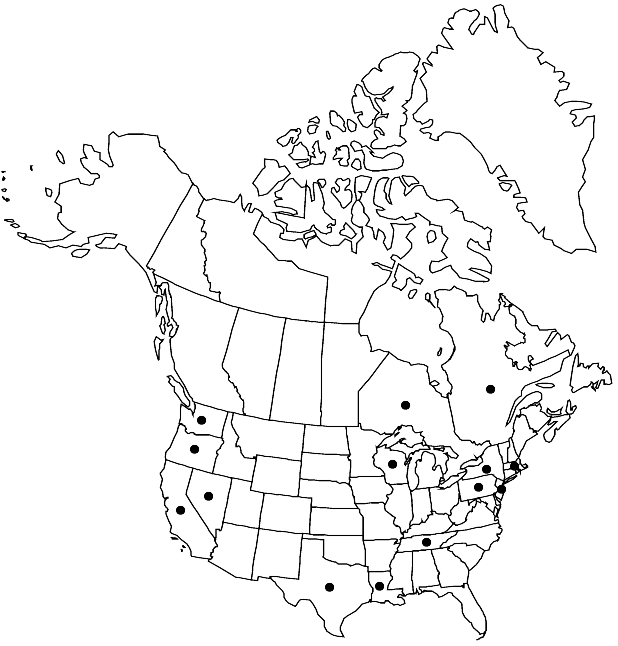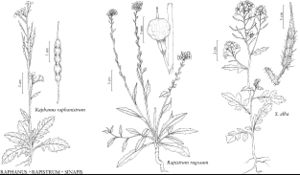Rapistrum rugosum
Fl. Pedem. 1: 640. 1785.
Plants hispid proximally, glabrous distally. Stems (1–) 2–10 (–15) dm. Basal leaves: petiole 1–5 cm; blade with 1–5 lobes each side, 2–25 cm, margins irregularly dentate, lateral lobe oblong or ovate, terminal lobe suborbicular or ovate, larger than lateral. Cauline leaves: blade simple or sinuately lobed, margins subentire or dentate. Fruiting pedicels erect, (appressed to rachis), 1.5–5 mm. Flowers: sepals 2.5–5 mm; petals pale-yellow, 6–11 × 2.5–4 mm; filaments 4–7 mm; anthers 1.2–1.5 mm. Fruits: valvular segment ellipsoid, 0.7–3 × 0.5–1.5 mm; terminal segment globose or ovoid, 1.5–3.5 × 1–2.8 mm, usually rugose or ribbed, rarely smooth; style 1–3 (–5) mm. Seeds 1.5–2.5 mm. 2n = 16.
Phenology: Flowering Apr–Jul (Nov–Jun in Texas).
Habitat: Roadsides, disturbed sites, waste places, fields, grassy banks, ballast
Elevation: 0-2000 m
Distribution

Introduced; Ont., Que., Calif., Ind., La., Mass., Nev., N.J., N.Y., Oreg., Pa., Tenn., Tex., Wash., Wis., Europe, also in Mexico, South America, Asia, Africa, Atlantic Islands, Australia
Discussion
Three subspecies of Rapistrum rugosum have been recognized, including: subsp. rugosum, subsp. linnaeanum Rouy & Foucaud, and subsp. orientale (Linnaeus) Arcangeli. They are distinguished mainly on the basis of silique shape, rugosity, prominence of ribs, and the length and thickness of fruiting pedicels. These features vary considerably and intergradation occurs in such a wide array of combinations that it seems rather meaningless to recognize them without further studies. All three subspecies and some of their intermediates have been found in the United States (I. A. Al-Shehbaz 1985; R. C. Rollins 1993). The species was first collected in the flora area in 1873 as a ballast plant from Boston, Massachusetts (Al-Shehbaz).
Selected References
None.
Lower Taxa
"elongated" is not a number."thick" is not a number."dm" is not declared as a valid unit of measurement for this property."dm" is not declared as a valid unit of measurement for this property.
